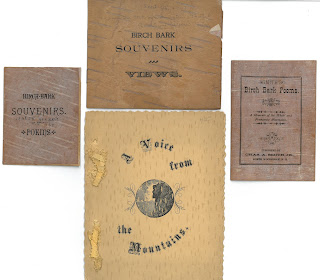 Sometimes a book's form and content give little indication of the life its author led. Birch Bark Poems, by Charles Fletcher Lummis, is just such a book. A collection of small poems written in the transcendental style, Birch Bark Poems is printed on thin and delicate birch bark, sporting beautiful engravings of birch trees on front and back.
Sometimes a book's form and content give little indication of the life its author led. Birch Bark Poems, by Charles Fletcher Lummis, is just such a book. A collection of small poems written in the transcendental style, Birch Bark Poems is printed on thin and delicate birch bark, sporting beautiful engravings of birch trees on front and back.Birch Bark Poems began as a summer enterprise in Lunmis's college years. Lummis attended Harvard and was a known jock and rebel, but during his summers he worked at the Profile House in the White Mountains as the in-house printer of things like menus and programs. Lummis had been enamored with printing for several years, and was efficient enough at his job to do some projects on the side.
 Lummis was a fairly serious poet, and after a few years on the shores of Profile Lake (where he was known to sleep in a birch bark canoe) he had written enough poems that he deemed publishable if they were to come in an attractive package. Lummis printed his poems on birch bark, puzzling out the medium's eccentricities and making about a dozen little books to sell for twenty-five cents each in the Profile House gift shop. The books were far more popular than expected, and by the end of the next summer Lummis had printed over 3,500 copies in various editions. Lummis's enterprise was so successful that other publishers in the area began to put out similar books of poetry and engravings of local scenes on birch bark, and even on fake birch bark paper (Birch Bark Souvenirs, Views, F41.32 B57; Smith's Birch Bark Poems, PS595.W4 S54 1900; and A Voice from the Mountains PS595.W4 G73).
Lummis was a fairly serious poet, and after a few years on the shores of Profile Lake (where he was known to sleep in a birch bark canoe) he had written enough poems that he deemed publishable if they were to come in an attractive package. Lummis printed his poems on birch bark, puzzling out the medium's eccentricities and making about a dozen little books to sell for twenty-five cents each in the Profile House gift shop. The books were far more popular than expected, and by the end of the next summer Lummis had printed over 3,500 copies in various editions. Lummis's enterprise was so successful that other publishers in the area began to put out similar books of poetry and engravings of local scenes on birch bark, and even on fake birch bark paper (Birch Bark Souvenirs, Views, F41.32 B57; Smith's Birch Bark Poems, PS595.W4 S54 1900; and A Voice from the Mountains PS595.W4 G73).Lummis was an excellent self-publicist, so he had the brilliant idea that he would send a few copies of his book to the eminent poets of the day--Whitman, Longfellow, and Lowell, to name a few--who actually responded with encouragement. With these poets' blessing, Lummis proceeded to send his book to literary journals and even Life Magazine, who thought the binding of the book was better than the poems within, but that they "may have some lasting power."
To learn more about Lummis's colorful life, see Mark Thompson's American Character: The Curious Life of Charles Fletcher Lummis and the Rediscovery of the Southwest (New York, Arcade, 2011).
Ask for White Mountains PS3523.U49 B5 1870, PS3523.U49 B5 1880, and PS595.W4 B46 1900 to see editions of Birch Bark Poems. For a political rather than aesthetic use of birch bark for printing, check out Pokagon's Red Man's Rebuke.
Posted for Kassie Amann '16

No comments :
Post a Comment